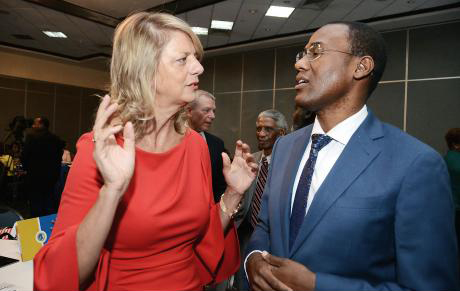(Jamaica Gleaner): Finance Minister Dr Nigel Clarke has advised Jamaicans to take their business elsewhere if commercial banks fail to follow the lead of the central bank in reducing their interest rates.
“Medium-sized and small businesses need to demand of their financial institutions that they benefit from these reductions in interest rate and that they put themselves in a position to shop their businesses to alternative institutions if their financial institutions refuse to lower their interest rates,” Clarke declared during Thursday’s opening ceremony of the Caribbean Leadership Project symposium
Given the complexities of governance in the 21st century, democracy demands an informed population that is able to fully understand the intricacies of state policies among other issues of national interest, to make informed decisions, Clarke pointed out while delivering the keynote address.
LOWERED INTEREST RATES
“So, for example, the Bank of Jamaica has lowered their policy interest rate since October 2016 from five per cent in eight moves downwards to two per cent yesterday (Wednesday). As a result of that, banks have the incentive to lend to businesses at lower and lower rates.
“So medium-sized and small businesses need to demand of their financial institutions that they benefit from these reductions in interest rates and that they put themselves in a position to shop their businesses to alternative institutions, if their financial institutions refuse to lower their interest rates,” the finance minister told the audience of regional participants at The Jamaica Pegasus hotel, New Kingston.
Clarke, who enjoyed success as a businessman before entering politics, used the two-day leadership symposium entitled ‘Building Leadership Resilience: From Surviving to Thriving’ to underscore the value of effective communication in business, and, by extension, national development.
“That is the central challenge because policy in the 21st century is complex, and we need the population to understand that it is only transformational leadership that is going to allow us the opportunity to do so,” argued Clarke.

